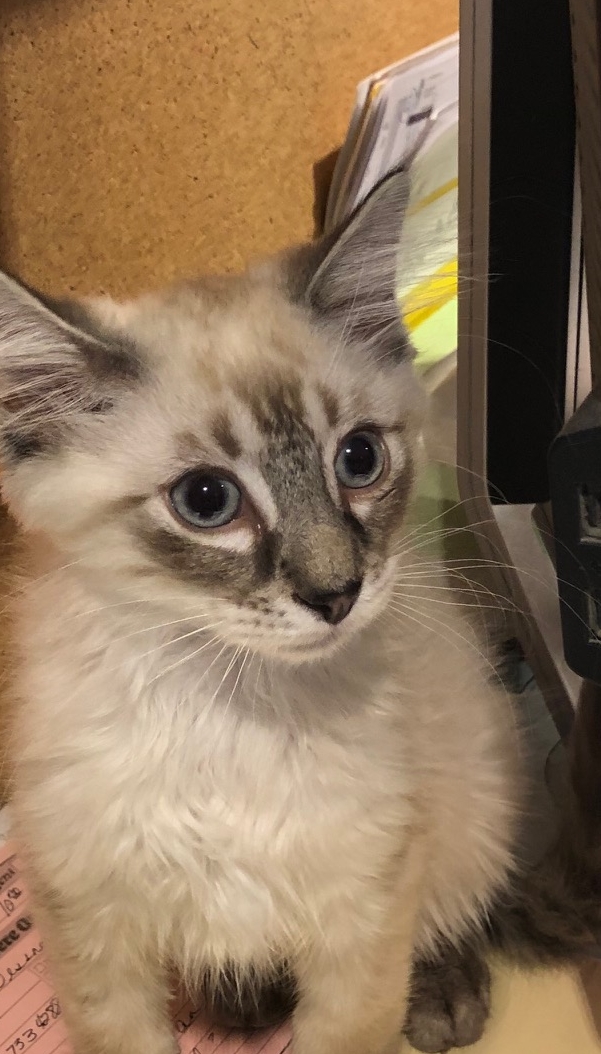|
We are happy you have chosen us to help you take care of your new pet. Having a new kitten can be a very exciting experience-and trying at times. This information will help you get started on some of the kitten basics.
 Feeding Your Kitten Feeding Your Kitten
Cats are carnivores (meat eaters) by nature, and have some fairly specific nutritional needs. These needs can be best met with a good quality commercial cat food.
Kittens should be fed kitten food until they are 12 months of age, since kittens continue to grow and develop throughout that first year. Kittens do well when food is available at all times. They tend to be nibblers, and may eat many small meals during the day. Provide a fresh bowl of food and water daily.
Contrary to popular beliefs, kittens do not need milk. In fact, cow’s milk is not like cats milk, and can be difficult for your kitten to digest, and may cause diarrhea.
Because of their sedentary lifestyles, indoor cats especially tend to be prone to obesity as they get older. Research has shown that cats that are slim and trim tend to have fewer health problems and live longer than their overweight counterparts.
Please call us if you would like some help with a weight loss plan for an overweight pet.
Vaccinations
The health of your new kitten during his or her first months is dependent on his/her body’s ability to fight off disease. Having your kitten vaccinated regularly against diseases such as feline rhinotracheitis, calci virus, and panleukopenia will help his/her body built up a strong immune system.
Kittens should receive their first “distemper” vaccination at 6 to 8 weeks of age then a booster 3 to 4 weeks until they are over 12 weeks of age.
At 12 weeks of age your kitten can get vaccinated against rabies virus. There is a significant population of wildlife in this area infected with rabies (notably raccoons, bats, and skunks). Remember that rabies is contagious to humans and is universally fatal, so vaccinating your pet for this disease not only protects your pet, but you and your family as well.
Most kittens which are obtained from a shelter have already been tested and are negative for Felv and FIV (two immunodeficiency viruses of cats). If you are bringing a new cat into a home that includes other cats, it is especially important to have this information. If you are unsure of the Felv/FIV status of your kitten, a quick blood test can set your mind at ease. Felv is passed from cat to cat during prolonged contact or fighting with an infected cat, so if your kitten is going to be spending any time outside, we recommend vaccinating for Felv. Vaccinating for Felv involves 2 vaccines given 3-4 weeks apart, then a yearly booster.
Parasites
Your new kitten may have arrived at your home with some tag-along friends, intestinal parasites. Roundworms, hookworms, tapeworms, and coccidian are common intestinal parasites. They can cause weakness, depression, weight loss, diarrhea, and vomiting.
Human infection with roundworms is possible but rare. It most commonly occurs in children playing in areas such as sand boxes and yards contaminated with dog or cat feces. This can be avoided by covering sand boxes when not in use, and by proper hygiene which include hand washing after playing outside or playing with young animals.
Intestinal parasites can be detected by routine fecal exams. Treatment is relatively simple. We recommend bringing a sample of fresh stool with you at the time of each vaccination and check up.
Neutering & Spaying
Kittens may be neutered as early as 5 months of age. Females can be very vocal during their estrus (heat) cycle so spaying early can help eliminate the crying. It may also add years to her life by eliminating potential health problems including tumors and uterine diseases.
Neutering your male kitten may make him less likely to “mark his territory” with urine, fight with other cats, and also may help keep him close to home. Prior to your kitten’s surgical procedure, we will discuss preanesthetic blood testing with you. This testing is not mandatory, but it is recommended. It helps us be aware of and try to avoid potential problems that we may encounter during surgery, and also provides us with valuable baseline info in case of later illnesses.
Dental Care
Routine dental care is an important part of your kitten’s life-long health and well being. Proper dental care can help prevent oral discomfort, liver, lung, kidney, and heart problems that may develop later. It is not too soon to start brushing your kitten’s teeth. This way they become accustomed to the brushing and may even look forward to their chicken or vanilla mint flavored toothpaste.
Do not use human toothpaste, since swallowing it may cause an upset stomach. Have your veterinarian show you the different types of tooth brushes and explain how to get your kitten used to having his/her teeth brushed. Also consider that certain diets may help keep your cat’s teeth cleaner than others. Ask us for recommendations. At every yearly exam, the doctor will inspect your cat’s teeth and gums and recommend a routine dental cleaning if needed.
Flea and Tick Control
Your veterinarian will examine your kitten for evidence of external parasites. Fleas are blood sucking, potentially disease carrying parasites that can cause your kitten to become very anemic and ill. It is interesting and disturbing to note that for every flea you see on your kitten there are 20 eggs and larvae in your house!
Please ask our staff for advice on flea and tick control that will best suit your kitten’s needs – even if your kitten does not have a current problem. There are many options for treating infestations. Newer products that are very effective include a six month injection, and monthly oral medications for fleas or monthly spot-on applications for both fleas and ticks.
Kitten Proof Your Home
Kittens are very playful and can get into trouble. Be aware of electrical cords, open windows, and high balconies. Hide cleaning products, insecticides, poisonous plants, and small items kittens could swallow. Do not allow your kitten to play with yarn or string unsupervised. If it gets swallowed, it could lodge in the intestinal tract. Even things like rubber bands, thread, and Christmas tree tinsel can pose particular threats if swallowed.
Hairballs
As cats groom themselves, they swallow hair which accumulates in the digestive tract. Usually this is passed uneventfully. Some cats, especially, long-haired cats or those who groom excessively may experience trouble passing the hairballs. Signs of this include coughing, gagging, and vomiting.
Consult your veterinarian if you think your cat has this problem. There is a gel that can be given which lubricates the ingested hair and allows it to pass through the gastrointestinal tract. Most cats enjoy the taste of the gel so treatment is simple.
Thank you for taking time to read about kitten care. The veterinarians and staff at Green Mountain Veterinary Hospital would like for you to enjoy the kitten stage, as well as set the foundation for a nice healthy family pet. If you have any questions, please call and ask our staff for advice. Good Luck and enjoy your kitten!
|



 Feeding Your Kitten
Feeding Your Kitten